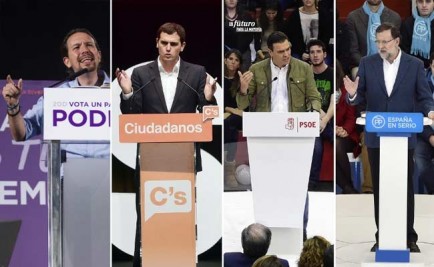
The political impasse remains, meaning Spaniards will likely have to go to the polls again on June 26.
The months-long political deadlock that has followed last December’s general election looks set to ultimately end with Spaniards asked to go back to the polls in June…
With no single party able to secure a majority government after the December vote, the hope was that the various parties would be able to form a coalition, such as that seen in the UK after the 2010 vote, and the current German ‘grand’ coalition between the CDU and SPD.
However, such are the conflicting political stances of Spain’s leading parties that no compromise has yet been found despite months of talks and even an intervention earlier in the year by King Felipe himself.
The latest twist comes after leftwing upstart party Podemos – which only formed in 2013 but found itself securing nearly the third-highest number of votes last December – rejected a possible coalition deal between the left-of-centre Socialists and the centrist Ciudadanos parties.
Had the deal been agreed it would have meant Socialist leader Pedro Sánchez would be Prime Minister, supported by the third- and fourth-largest parties in terms of votes. However, 88% of Podemos members voted against the coalition, which had widely been viewed as the most viable and likely to work.
So where does Spain stand now? Well, caretaker and former Prime Minister Mariano Rajoy is still nominally in charge as head of the Popular Party (PP), but is bound by the constitution to call another general election – with June 26 cited as the date that Spaniards will, in all likelihood, have to go back to the polls.
Other options that were on the table but rejected by the parties in question include the formation of Spain’s very own ‘Grand Coalition’ – between the two largest parties, the PP and the Socialists – and a rather far-fetched scenario that would see the right-of-centre PP shack up with Podemos AND Ciudadanos, something that was never likely to happen.
One possible solution that could avert the need for a second election would be for the Socialists to enter into a coalition with other regional and leftwing parties instead, but it is unlikely that harvesting these allies will garner the required ‘votes’ needed to form a majority government. After all, for all of the criticism being levelled at Rajoy’s PP, it is easy to forget that they polled more votes than any other party in December.
But the signs seem to suggest a re-election unless a final round of talks chaired by King Felipe can yield a breakthrough. Few Spaniards will hold their breath, with most reassessing how they will vote again in the summer, when the football Euro Championships will be in full swing, the weather will be scorching and the UK may – or may not – have voted to leave the EU a few days earlier.
So there is a lot to play for, especially according to one poll that suggests Rajoy’s popularity during this prolonged impasse may have actually risen… stranger things have happened.
 en
en



 Vlaams-Nederlands
Vlaams-Nederlands
0 Comments
Leave a Comment
DISCLAIMER
The opinions and comments expressed by contributors to this Blog are theirs alone and do not necessarily reflect the views of VIVA Homes Under the Sun Ltd, any of its associated companies, or employees; nor is VIVA to be held responsible or accountable for the accuracy of any of the information supplied.
Have you got something to say?